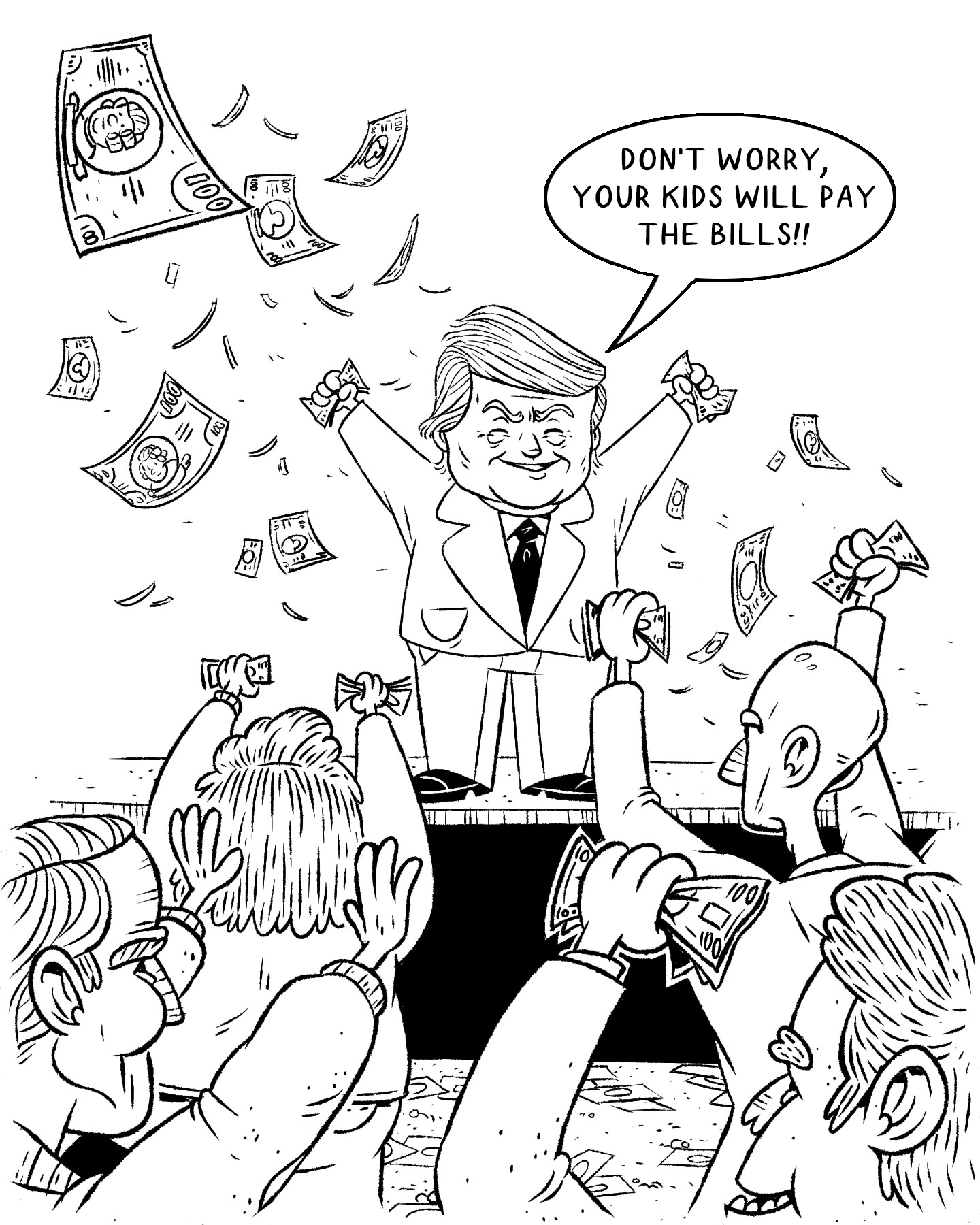Excerpts from Confessions of an Old Man

“There’s nothing like doing things with other people’s money.” President Donald Trump
March 22, 2020 – Every US president since Reagan has added hundreds of billions to the national debt compared to his predecessor. President Trump may top all the previous presidents by having an estimated annual deficit of $1 trillion by 2020 or even sooner. Congress and the White House have been living on the backs of the younger generation since 1980 by continuing to spend more than they collect in taxes. They have no plans to balance the budget, nor do they have any plans to pay back the principal on the debt. Having no intention or plans to pay the national debt is nothing less than stealing from the MI generation.
In May 2016 candidate Trump proudly claimed, “I’m the king of debt. I love debt.” As president, he has made it clear that he does not mind if deep tax cuts result in a ballooning of the national debt. He proved that by signing the Tax Cuts and Jobs Act in December 2017. During the 2016 campaign, candidate Trump bragged about using other people’s money. He said:
“It’s called OPM. I do that all the time in business. It’s called other people’s money. There’s nothing like doing things with other people’s money.” However, in this case, OPM is coming from the MI generation. The reason Congress and the White House don’t care and continue to add to the national debt is because it is not their problem. Congress’s own self-interest trumps any concerns it may have for high national debt’s detrimental impact on future generations. They will be long gone before any of the serious problems from uncontrolled national debt surface.
“The most significant threat to our national security is our debt,” said former chairman of the Joint Chiefs of Staff Michael Mullen back in 2010. He went on to state:
“That’s why it’s so important that the economy move in the right direction, because the strength and the support and the resources that our military uses are directly related to the health of our economy over time.”
Seven years later, Federal Reserve chairwoman Janet Yellen, in her testimony to Congress in November 2017 about the national debt that was estimated to surpass $20 trillion, stated:
“The debt is the type of thing that should keep people awake at night…This should be a very significant concern.”
Yet all these warnings have fallen on deaf ears. Congress is exporting millions of American jobs, making it the largest exporter of jobs. According to the Congressional Budget Office (CBO), the budget deficit is projected to reach $1 trillion by 2020. The interest payments alone on the national debt are expected to reach $380 billion per year by then. About 35 percent of the US national debt is owned by foreign countries, with China being the largest lender. In plain English, by 2020, about $133 billion of the interest payments will go overseas to pay foreign lenders. If that amount were invested in the United States, it would create over a million jobs—but it will be exported by the US government instead.
Continued dependency on deficit financing of the US budget over the long run will weaken the dollar as a reserve currency. Reserve currency refers to the currency that is held by foreign governments and financial institutions in significant amounts as part of their foreign exchange reserves. It reflects the strength and stability of that currency and the government behind it—that is, in the case of the United States, the dollar backed by the full faith of the US government. A weakened dollar will require the government to pay higher interest rates for its future borrowing and will result in higher loan payments on the national debt. This will result in more money going overseas and will create more jobs outside the United States. Subsequently, higher interest rates on personal, business, and mortgage loans will ensue. Furthermore, losing reserve currency status would reduce foreign companies’ incentive to invest in America.
Despite these facts, Congress continues to borrow more money to pay for the federal deficit. It even borrows money to make interest payments on those loans. This is congruent to the 2008 financial crisis, where Americans bought homes they could not afford and borrowed money to make monthly payments on their mortgages. That scenario eventually led to the collapse of the US economy, millions of homes in foreclosure, and jobs lost. As the national debt continues to grow, the interest payments on it will also increase proportionally. The size of the interest payments will grow even higher as the interest rate goes up. A one percent increase in the interest rate will add $200 billion in annual interest payments and continue to take a larger share of the national budget. That will leave less money available to pay for other programs, such as Social Security, Medicare, and other safety-net programs. In the end, there may not be any funds available for national emergencies, natural disasters, or research.
Unchecked federal spending and borrowing to finance that spending will have dire consequences for the MI generation. In the long run, the continued national deficit will leave less money for investments as the government competes against the private sector to borrow funds to meet its debt payments. Lower investments will result in lower national income, fewer job opportunities, higher unemployment, and more inequality. Yet, Congress continues to enact so-called tax reforms and add more debt on the MI generation, as it did in December 2017 under Trump’s tax cuts.
What if President Trump cancels $1.4 trillion in student loans instead of giving tax breaks to the top one percenters?
